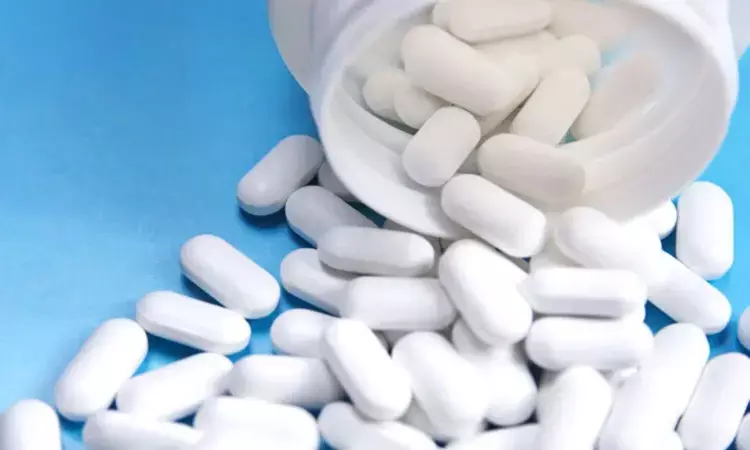- Home
- Medical news & Guidelines
- Anesthesiology
- Cardiology and CTVS
- Critical Care
- Dentistry
- Dermatology
- Diabetes and Endocrinology
- ENT
- Gastroenterology
- Medicine
- Nephrology
- Neurology
- Obstretics-Gynaecology
- Oncology
- Ophthalmology
- Orthopaedics
- Pediatrics-Neonatology
- Psychiatry
- Pulmonology
- Radiology
- Surgery
- Urology
- Laboratory Medicine
- Diet
- Nursing
- Paramedical
- Physiotherapy
- Health news
- Fact Check
- Bone Health Fact Check
- Brain Health Fact Check
- Cancer Related Fact Check
- Child Care Fact Check
- Dental and oral health fact check
- Diabetes and metabolic health fact check
- Diet and Nutrition Fact Check
- Eye and ENT Care Fact Check
- Fitness fact check
- Gut health fact check
- Heart health fact check
- Kidney health fact check
- Medical education fact check
- Men's health fact check
- Respiratory fact check
- Skin and hair care fact check
- Vaccine and Immunization fact check
- Women's health fact check
- AYUSH
- State News
- Andaman and Nicobar Islands
- Andhra Pradesh
- Arunachal Pradesh
- Assam
- Bihar
- Chandigarh
- Chattisgarh
- Dadra and Nagar Haveli
- Daman and Diu
- Delhi
- Goa
- Gujarat
- Haryana
- Himachal Pradesh
- Jammu & Kashmir
- Jharkhand
- Karnataka
- Kerala
- Ladakh
- Lakshadweep
- Madhya Pradesh
- Maharashtra
- Manipur
- Meghalaya
- Mizoram
- Nagaland
- Odisha
- Puducherry
- Punjab
- Rajasthan
- Sikkim
- Tamil Nadu
- Telangana
- Tripura
- Uttar Pradesh
- Uttrakhand
- West Bengal
- Medical Education
- Industry
Case of Acetaminophen overdose leading to mixed sulfhemoglobinemia and methemoglobinemia: A report

USA: In a recent case study published in Toxicology Reports, the researchers have reported a rare case of mixed sulfhemoglobinemia and methemoglobinemia in the setting of significant, isolated acetaminophen ingestion.
"Though overdoses of acetaminophen are common, acetaminophen-induced methemoglobinemia is rare and is thought to be caused due to oxidative stress from reactive metabolites," Justin A. Seltzer from the University of California in San Diego, San Diego, CA, USA, and colleagues wrote in their case study. "However, not many cases of sulfhemoglobinemia in the setting of acetaminophen overdose have been reported before."
The case in question is of a 30-year-old African American male presented after an intentional ingestion of 50 tablets of 500 mg acetaminophen two days before. He was tachypneic and cyanotic.
Peripheral oxygen saturation on room air was 78 % and minimally improved with high-flow oxygen. The patient was noted to have thrombocytopenia, leukocytosis, acute kidney injury, anion gap metabolic acidosis with lactic academia, hyperbilirubinemia, coagulopathy, and transaminitis. The arterial partial pressure of oxygen was observed to be normal. Sulfhemoglobinn and methemoglobin were 5.2 % and 8.5 %, respectively. Methylene blue was administered along with intravenous N-acetylcysteine and did not lead to any clinical improvement. Hemolytic anemia was subsequently noted. Glucose-6- phosphate dehydrogenase (G6PD) deficiency was confirmed with genetic testing and a quantitative assay. He also received one dose of intravenous (IV) metoclopramide. The patient required eight units of packed red blood cells and several weeks of hemodialysis before discharge on hospital day 43. At the time of discharge, he had residual but improving renal dysfunction and no longer needed hemodialysis.
The authors present a case of mixed sulfhemoglobinemia and methemoglobinemia in the setting of a large, untreated ingestion of acetaminophen exacerbated by the administration of methylene blue due to occult G6PD deficiency. There is no clarity on the ultimate cause of the patient's dyshemoglobinemias; they hypothesized that acetaminophen-induced oxidative stress triggered the formation of both sulfhemoglobin and methemoglobin. There needs to be more clarity on the role of G6PD deficiency as a risk factor for sulfhemoglobinemia formation. They acknowledged that a lack of comprehensive laboratory screening limits the report and that we cannot exclude an occult, alternative causative agent entirely.
The authors conclude that acetaminophen overdoses presenting with methemoglobinemia should prompt concern for underlying G6PD deficiency.
"Early consideration of coincidental sulfhemoglobinemia should be done if the pulse oximetry is lower and the patient appears more symptomatic than the measured methemoglobin concentration alone would suggest," they wrote. "However, confirmation of sulfhemoglobinemia will be delayed in most conditions."
"These factors prompted methylene blue use in this case, despite the low measured percentage of methemoglobin, which likely triggered hemolytic anemia," the team explained. "The use of methylene blue in a similar circumstance, regardless of the underlying cause, should be weighed carefully against iatrogenic harm risk."
Reference:
Seltzer, Justin A., et al. "Sulfhemoglobinemia and Methemoglobinemia Following Acetaminophen Overdose." Toxicology Reports, vol. 9, 2022, pp. 1725-1727.
Dr Kamal Kant Kohli-MBBS, DTCD- a chest specialist with more than 30 years of practice and a flair for writing clinical articles, Dr Kamal Kant Kohli joined Medical Dialogues as a Chief Editor of Medical News. Besides writing articles, as an editor, he proofreads and verifies all the medical content published on Medical Dialogues including those coming from journals, studies,medical conferences,guidelines etc. Email: drkohli@medicaldialogues.in. Contact no. 011-43720751


